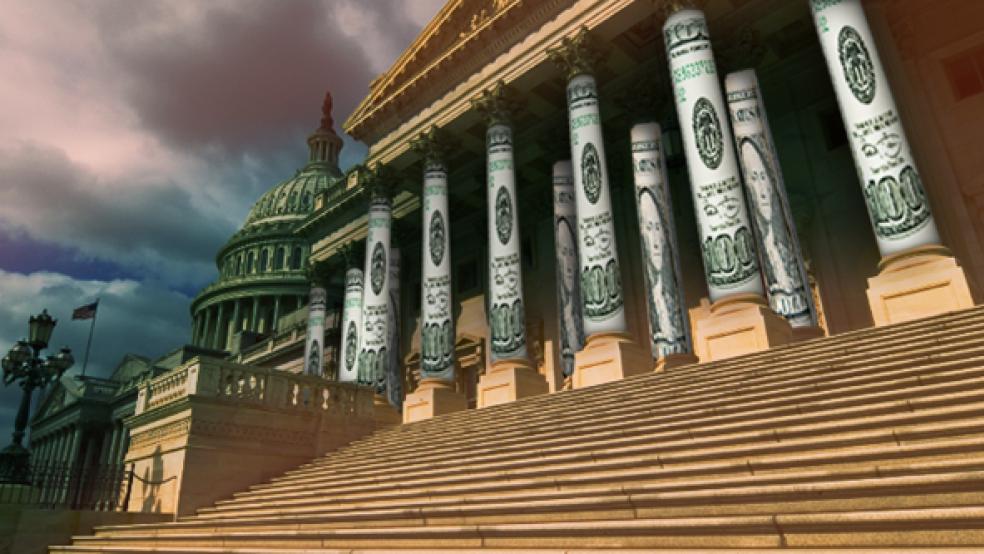When the chips were down Tuesday evening, 28 of the 232 House Republicans voted with Democrats to raise the federal debt ceiling, arguably one the most politically odious responsibilities facing lawmakers.
The Democratic-controlled Senate followed suit Wednesday afternoon, voting 55 to 43 to approve the increased borrowing authority and send the measure to President Obama for his signature.
Typically, the task falls to the majority party in the House and Senate to make good on the government’s financial commitments and avert the prospect of a first-ever default on the U.S. debt. But with House Speaker John Boehner (R-OH) unable to muster 218 votes within the GOP majority to raise the debt ceiling, it was left to Minority Leader Nancy Pelosi (D-CA) and her Democratic colleagues to deliver the bulk of the votes.
Related: ‘Clean’ Debt Ceiling Bill Squeaks by House
The Democrats delivered 193 votes – with all but Reps. Jim Matheson of Utah and John Barrow of Georgia joining in. Boehner and his GOP colleagues had to deliver at least 24 Republican votes to push the bill extending the Treasury’s borrowing authority for another year across the finish line – and they did it with four votes to spare.
The final vote to approve the measure, 221 to 201, marked a combination of GOP leadership surrender to President Obama and business leaders on a critical fiscal issue and strategic maneuvering by others to distance themselves from a vote that could hurt their political ambitions or be used against them in the mid-term elections.
Many wanted to avoid the kind of political squabbling that led to a government shutdown last fall. Most importantly, the GOP has its eye on the mid-term elections and hopes to capture a Senate majority by hammering away at Obamacare. Strategically, anything else is considered a distraction.
Obama and congressional Democrats had long demanded a “clean” bill to raise the Treasury’s borrowing authority above the current limit, devoid of any GOP policy or spending demands. Treasury Secretary Jack Lew warned that the government would bump up against default by late February unless Congress took action.
Boehner and his lieutenants had tried to force the president to accept a number of conditions -- including restoration of cuts in some veteran retirement benefits and approval of the Keystone XL pipeline. In the past, Obama had bowed to GOP demands, but this time he stood firm against any add-ons to debt-ceiling legislation.
Boehner vowed that he would not allow a markets-jarring default on U.S. debt, and in the end concluded he had no choice but to accede to the demand for a clean bill. “It’s a disappointing moment,” he said shortly before the final vote, blaming the Democrats for refusing to link debt-ceiling action to useful spending or policy measures. “This is a lost opportunity.”
Related: Has the GOP’s Debt Ceiling Fever Really Broken?
According to a Roll Call analysis, of the 28 Republicans voting for the debt ceiling, only four were within the GOP leadership: Boehner, Majority Leader Eric Cantor of Virginia, Majority Whip Kevin McCarthy of California, and Chief Deputy Whip Peter Roskam of Illinois.
Conference Chairwoman Cathy McMorris Rodgers of Washington State -- The No. 4 House Republican who delivered the Republican response to Obama’s recent State of the Union address -- voted against the bill. Other leaders voting no were National Republican Congressional Committee Chairman Greg Walden of Oregon, House GOP Conference vice Chairwoman Lynn Jenkins of Kansas, Republican Conference Secretary Virginia Foxx of North Carolina, and GOP Policy Committee Chairman James Lankford of Oklahoma.
Lankford recently announced he would seek the seat being vacated by retiring Sen. Tom Coburn (R-OK). The Club for Growth and other conservative groups strongly urged House members to oppose the bill.
Obamacare Sticker Shock Found in Deductibles, Not Premiums
A handful of House Republican committee chairmen bit the bullet and supported the debt ceiling bill, likely out of loyalty to the leadership. They included Ways and Means Chairman Dave Camp of Michigan, Oversight and Government Reform Chairman Darrell Issa of California, Appropriations Chairman Harold Rogers of Kentucky, Foreign Affairs Chairman Ed Royce of California, Armed Services Chairman Howard “Buck” McKeon of California and Natural Resources Chairman Doc Hastings of Washington.
Fifteen other GOP committee chairmen voted against the measure, including Budget Chairman Paul D. Ryan of Wisconsin, the Republicans’ 2012 vice presidential nominee who is considering a bid for president in 2016.
A few GOP moderates and a number of others who will be retiring at the end of the year threw their support to the debt ceiling legislation. The moderates included Charlie Dent of Pennsylvania and three New Yorkers: Michael G. Grimm, Peter T. King and Richard Hanna. The retiring Republicans who don’t have to worry about the consequences of their vote included McKeon, Frank R. Wolf of Virginia, Jon Runyan of New Jersey and Howard Coble of North Carolina.
This article was updated at 3:57 p.m.
Top Reads from The Fiscal Times:





